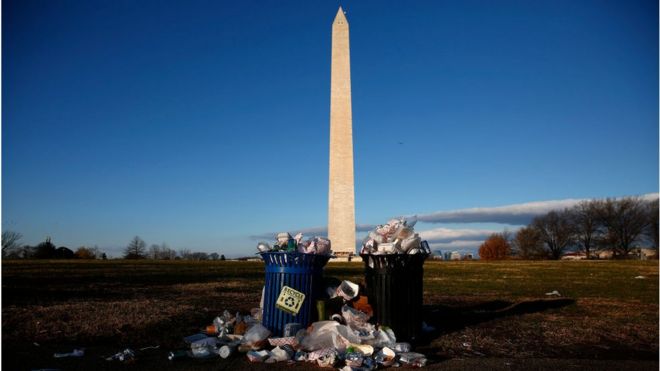 WIN MCNAMEE VIA GETTY IMAGES
WIN MCNAMEE VIA GETTY IMAGES
The partial US government shutdown has entered the new year as President Donald Trump's border wall standoff with Congress remains unresolved. With federal closures now on day 12, around 800,000 employees are feeling the impacts of no funding and no pay.
On Wednesday, Mr Trump insisted he would keep the government closed for "as long as it takes" to fund the border wall as he met top Democrats and Republicans at the White House.
But the shutdown showed little signs of ending after lawmakers said they would return to the White House on Friday to continue negotiations.
And as agencies drop all non-essential work, the consequences are wider-reaching than just quiet Washington DC streets and shuttered museums.
Since 22 December, Americans nationwide have expressed their worry and anger over the situation, taking to social media to share how they cannot pay their bills or afford medication thanks to the shutdown.

'We won't be able to pay our mortgage'
The partial shutdown means about 25% of the US federal government has no funding. Only essential employees will continue working, but they'll do so without pay.
Nine departments have been affected by the shutdown, including Homeland Security, Justice, Housing, Agriculture, Commerce, Interior, and the Treasury.
Around 800,000 federal workers are now furloughed - that is, temporarily laid off due to a lack of funding - or working without pay.
Many hope they will receive back pay when the government resumes, but that remains uncertain. Some have resorted to second jobs or fundraising to get by in the meantime.
Employees have taken to Twitter to express their frustration over the shutdown, sharing financial difficulties with the hashtag #ShutdownStories.


Julie Burr, a contracted worker, told the BBC's Newsday that she has lost two weeks worth of wages thus far - with no guarantee she will be repaid.
"I am a single mother so I am on my own with this," Ms Burr says.
"I've worked with my landlord and we're ok for the month of January probably, but if it continues...and I keep going without wages, then we get into February's rent and that's when it's going to be difficult."
One federal employee, who requested to be identified only as Stacey, told the BBC she feels like "disaster could strike at any time".
She said that one of her children is severely autistic and receives medical services from the government. With the shutdown, Stacey now has to worry about affording emergency hospital care or doctor visits.
"Obviously if it goes on too long then I'm going to have to look at other options. I love my job but I can't go too long without pay."
A worker's union representing some 400,000 essential personnel on Monday filed a lawsuit against the Trump administration for allegedly violating the Fair Labour Standards Act by not paying these employees since 22 December.

No census in Indiana
And the impact stretches beyond the capital city.
In Indiana, the political standoff stopped US census work, with 40% of census bureau employees sent home without pay just after Christmas, according to the News and Tribune.

Rubbish piles in national parks
The National Park Service has suspended all non-emergency services, including all visitor services like public toilets, waste pickup, road maintenance and support centres, with over 21,000 employees now furloughed.
The parks remain generally accessible to the public, but conditions have deteriorated due to a lack of staff.
Noticeably, rubbish quickly began to pile up outside national sites, including around the National Mall and the White House.
Washington Mayor Muriel Bowser has been using the district's local resources to keep the capital clean at a cost of $46,000 (£36,500) per week.
In New York, Governor Andrew Cuomo has committed to paying $65,000 a day to ensure the Statue of Liberty and Ellis Island stay rubbish-free and open for tourists.
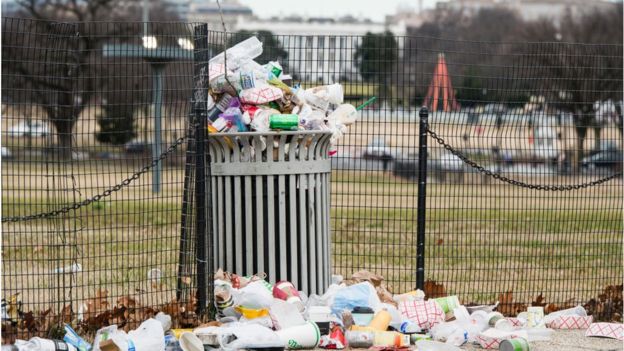 BILL CLARK VIA GETTY IMAGES
BILL CLARK VIA GETTY IMAGES
The Los Angeles Times reported human waste has created a health hazard in Yosemite after visitors began using the roadside as a replacement for public toilets.
And without snow ploughs or rangers to help handle wintry conditions, the Sequoia and Kings Canyon national parks in California have seen an increase in vehicle accidents due to dangerously icy roads.
In recent days, nonprofits and volunteers have pitched in to clean up parklands across the US. In Joshua Tree, volunteers nicknamed "toilet angels" have helped haul hundreds of pounds of rubbish out of the park and restock toiletries.
The lack of staff has also impacted visitor safety by way of rescues: One backpacker in Texas had to be carried for two hours by a single ranger after breaking his leg on a trail.
In addition, any park-operated monuments and homes are also closed, including the Frederick Douglass Historic Site, Ford's Theatre and Belmont-Paul Women's Equality National Monument.

Science setbacks
As many federally employed scientists stop working at agencies like the National Science Foundation, labs across the country are facing repercussions.
Researchers are concerned about their ability to access federal data and getting in touch with grant officials about project funding.
Rush Holt, head of the American Association for the Advancement of Science, emphasised the impact in a statement.
"Any shutdown of the federal government can disrupt or delay research projects, lead to uncertainty over new research, and reduce researcher access to agency data and infrastructure," Mr Holt said.

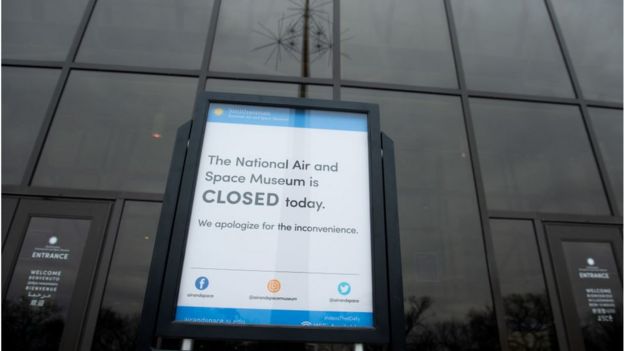 SAUL LOEB/GETTY IMAGES
SAUL LOEB/GETTY IMAGES
Panda cam goes offline
Tourists in DC will find all of the popular Smithsonian museums - like the Air and Space, African American History and Natural History museums - are now closed.
The National Zoo and all live-animal broadcasts - panda cam included - are also offline. The animals will still be cared for, the Smithsonian said.
Smithsonian spokeswoman Linda St Thomas told the BBC an estimated 1.2 million visitors will be turned away if the shutdown continues through January. She noted two thirds of Smithsonian employees are now furloughed.
The National Arboretum and National Archives have also shuttered.
The National Gallery of Art has managed to acquire enough funds to stay open until Thursday. Thanks to an earlier appropriations bill, the US Botanic Garden and Capitol Building are also open.
Meanwhile, nonfederal museums remain open with some, like the Woodrow Wilson House, offering free admission to federal workers.
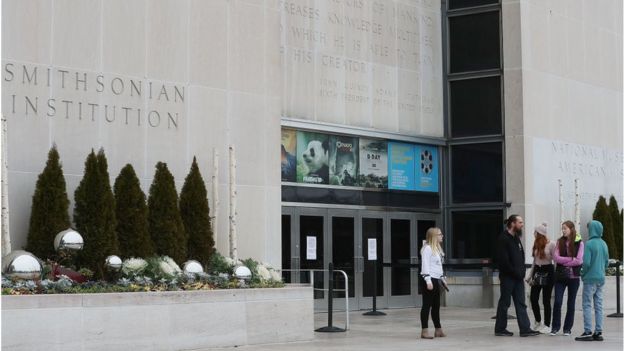 MARK WILSON VIA GETTY IMAGES
MARK WILSON VIA GETTY IMAGES
Native tribes struggling
Native American tribes receive substantial federal funding for essential services like healthcare and food as part of a deal negotiated decades ago in exchange for Native lands.
In Michigan, a Chippewa tribe has already been forced to use their own funds to pay some $100,000 (£79,400) to keep clinics and food pantries open, the New York Times reported.
Similar stories have cropped up across the country. Some Navajo tribes in New Mexico, Arizona and Utah are trapped in their homes without access to groceries and medicine due to unploughed roads.
In Minnesota, police officers on the Boise Forte Indian Reservation are already working without pay.

Discounted drinks in DC
Washington DC's local government is still operating, and has been reminding tourists that businesses and restaurants are also open for business.
And many local spots are offering discounts to government employees to help ease the strain of the shutdown.

Celebrity chef José Andrés, who owns a number of restaurants in the Washington DC area, announced that federal employees and their families could get a free sandwich at any of his establishments throughout the shutdown.

Italian restaurant Carmine's will also be offering free food to workers.

As Washington locals band together to address food concerns, the shutdown has also sparked national concerns over benefit programmes like food stamps.
The Department of Agriculture confirmed eligible families would continue to receive food assistance in January, but some programmes will operate solely on state funding through the shutdown.
The National Women, Infants and Children (WIC) Association, which provides food and education to low-income pregnant mothers and children, issued a statementurging lawmakers to end the shutdown before state agencies run out of funds.
"Over seven million mothers, pregnant women, and children rely on WIC," association president Rev Douglas Greenaway said.
"The uncertainty and confusion that a shutdown causes is not only disruptive to people's lives, but could also lead to significant health consequences."

'Unofficial' marriages only
The shutdown has also made its mark on some late December weddings in Washington DC.
One couple tweeted that their marriage remains unofficial since marriage bureau staff in the capital were furloughed during their wedding.

But those hoping to file for divorce can still do so as the intake centre has stayed open, Buzzfeed News reported.

Are you a federal employee or contractor affected by the government shutdown? Share your experiences by emailing haveyoursay@bbc.co.uk.
Please include a contact number if you are willing to speak to a BBC journalist. You can also contact us in the following ways:
- WhatsApp: +447555 173285
- Tweet: @BBC_HaveYourSay
- Send pictures/video to yourpics@bbc.co.uk
- Upload your pictures/video here
- Send an SMS or MMS to 61124 or +44 7624 800 100
- Please read our terms and conditions and privacy policy
Or use the form below
US & Canada
Apple shares sharply lower in US trading
- 3 January 2019
- Business
Democrats vow to pass US shutdown bills
- 3 January 2019
- US & Canada


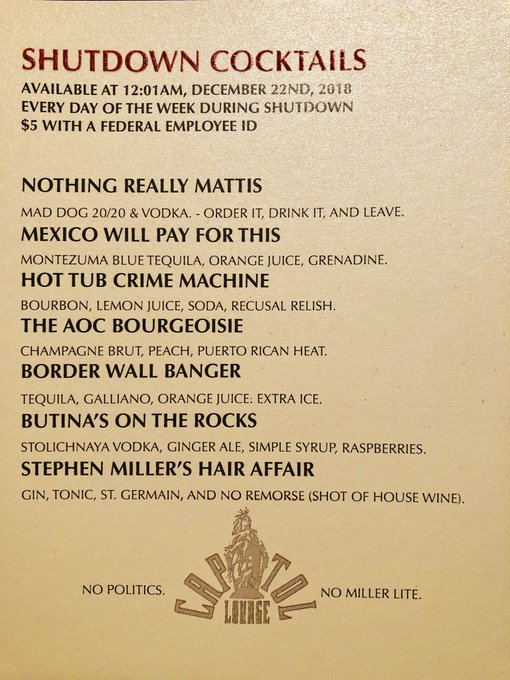




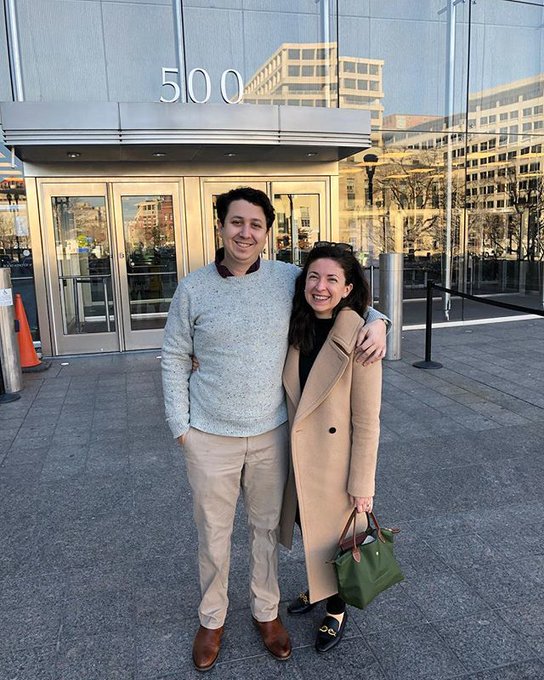






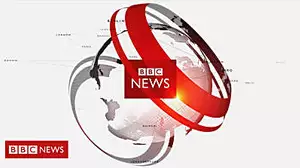




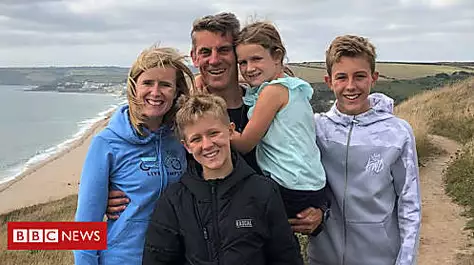
No comments:
Post a Comment